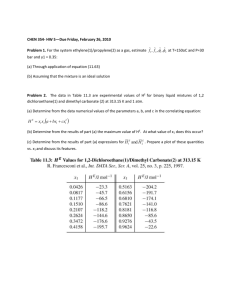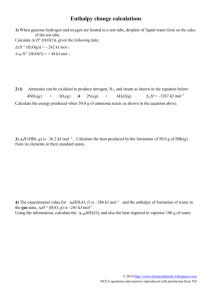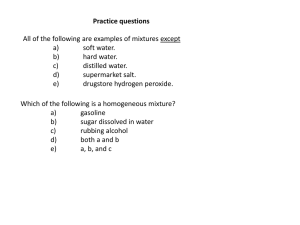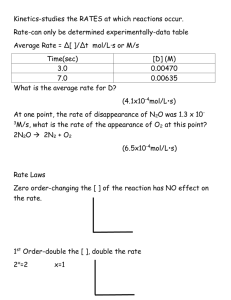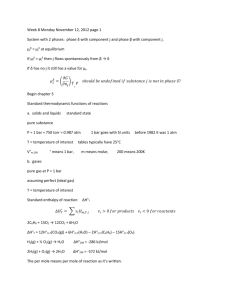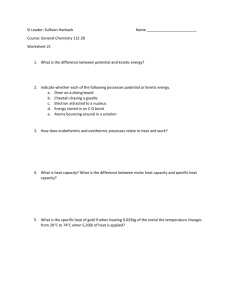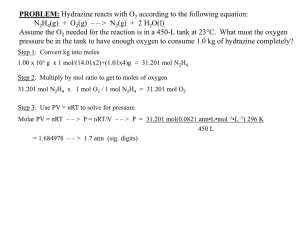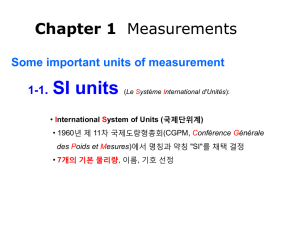Answers to Stoichiometry WS
advertisement
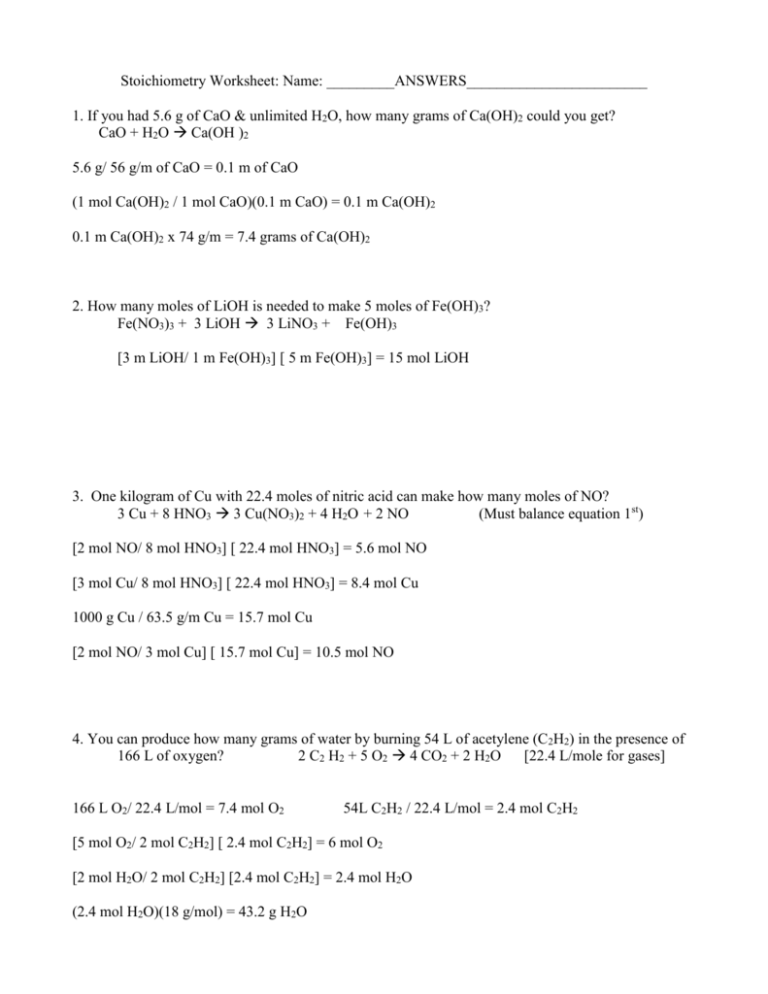
Stoichiometry Worksheet: Name: _________ANSWERS________________________ 1. If you had 5.6 g of CaO & unlimited H2O, how many grams of Ca(OH)2 could you get? CaO + H2O Ca(OH )2 5.6 g/ 56 g/m of CaO = 0.1 m of CaO (1 mol Ca(OH)2 / 1 mol CaO)(0.1 m CaO) = 0.1 m Ca(OH)2 0.1 m Ca(OH)2 x 74 g/m = 7.4 grams of Ca(OH)2 2. How many moles of LiOH is needed to make 5 moles of Fe(OH)3? Fe(NO3)3 + 3 LiOH 3 LiNO3 + Fe(OH)3 [3 m LiOH/ 1 m Fe(OH)3] [ 5 m Fe(OH)3] = 15 mol LiOH 3. One kilogram of Cu with 22.4 moles of nitric acid can make how many moles of NO? 3 Cu + 8 HNO3 3 Cu(NO3)2 + 4 H2O + 2 NO (Must balance equation 1st) [2 mol NO/ 8 mol HNO3] [ 22.4 mol HNO3] = 5.6 mol NO [3 mol Cu/ 8 mol HNO3] [ 22.4 mol HNO3] = 8.4 mol Cu 1000 g Cu / 63.5 g/m Cu = 15.7 mol Cu [2 mol NO/ 3 mol Cu] [ 15.7 mol Cu] = 10.5 mol NO 4. You can produce how many grams of water by burning 54 L of acetylene (C2H2) in the presence of 166 L of oxygen? 2 C2 H2 + 5 O2 4 CO2 + 2 H2O [22.4 L/mole for gases] 166 L O2/ 22.4 L/mol = 7.4 mol O2 54L C2H2 / 22.4 L/mol = 2.4 mol C2H2 [5 mol O2/ 2 mol C2H2] [ 2.4 mol C2H2] = 6 mol O2 [2 mol H2O/ 2 mol C2H2] [2.4 mol C2H2] = 2.4 mol H2O (2.4 mol H2O)(18 g/mol) = 43.2 g H2O 5. Given: Al2O3 + 3 H2SO4 Al2(SO4)3 + 3 H2O If I needed to produce 2.2 kg of aluminum sulfate, how many grams of aluminum oxide would I need to react with an unlimited amount of sulfuric acid? 2200 g / 342 g/mol = 6.4 mol Al2(SO4)3 (6.4 mol Al2O3)(102 g/mol) = 652.8 g Al2O3 6. Given: C12 H22 O11 + 12 O2(g) 12 CO2(g) + 11 H2O; Gases’ standard molar volume is 22.4L/mol. If I combust 1 kg of the above carbohydrate, how many liters of CO2 will I produce? (12g/m)(12) + (1g/m)(22) + (16 g/m)(11) = 342 g/m for C12 H22 O11 1000 g/ 342 g/m = 2.9 mol C12 H22 O11 (12 mol CO2/ 1 mol C12 H22 O11)(2.9 mol C12 H22 O11) = 35 mol CO2 (22.4 L/mol)(35 mol CO2) = 786 L CO2 7. If I used 5.6 g of copper in 50 mL of a 0.10 M solution of AgNO3, how much silver could I precipitate, given the following equation? Cu + 2 AgNO3 Cu(NO3)2 + 2 Ag (5.6 g/ 63.5 g/mol) = 0.088 mol Cu (0.050L)(0.10 mol/L) = 0.005 mol AgNO3 (1 mol Cu/ 2 mol AgNO3) (0.005 mol AgNO3) = 0.0025 mol Cu (2 mol Ag/ 2 mol AgNO3) (0.005 mol AgNO3) = 0.005 mol Ag (0.005 mol Ag)(108 g/mol) = 0.54 g Ag 8. Given: Fe2S+ 3 O2 (g) Fe2O3 + SO3 produced from 0.5 kg of Fe2S? How many grams of iron(III) oxide could be Fe2S: (56 g/mol)(2) + 32 g/m = 144 g/mol Fe2O3: (56 g/mol)(2) + (16 g/mol)(3) = 160 g/mol 500 g/ 144 g/mol = 3.47 mol Fe2S (1 mol Fe2O3/ 1 mol Fe2S)(3.47 mol Fe2S) = 3.47 mol Fe2O3 (3.47 mol)(160 g/mol) = 555 g Fe2O3

